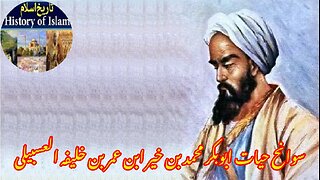Premium Only Content

Taqiyya Umm Ali bint Ghaith تقیہ ام علی بنت غیث ابن علی المنازی کی سیرت اور ان کے مزار کی تاریخ
@islamichistory813 #taqiyyaummalibintghaithibnalialarmanazi #sufisaint #cultural #heritage #biography #islamic #mysticism #islamic #philosophy #shrine #historical #figures
Biography of Taqiyya Umm Ali bint Ghaith ibn Ali al-Armanazi and the history of his shrine
Dekhti Aankhooon aur sountay kaanoon ko Asslamoalaikum, sisters, brothers friends and elders, in informative series videos of Islamic ascolars, sufisaints, cultural heritages, islamic philosophys, islamic mysticisms and historical figures. today we are describing biography of Taqiyya Umm Ali bint Ghaith ibn Ali al-Armanazi and the history of his shrine.
Taqiyya Umm Ali bint Ghaith ibn Ali al-Armanazi was a distinguished 12th-century Islamic scholar and poet, known for her intellectual excellence and poetic eloquence during the Ayyubid period. She was born in the year 505 AH (1111 CE) in Damascus, one of the major centers of Islamic learning and culture during the medieval Islamic world. Taqiyya came from a respected family with a scholarly background, which provided her with access to advanced religious and literary education from an early age. Her full name, which includes the title "Umm ?Al?," suggests both maternal status and scholarly respect, and the surname "al-Arman?z?" indicates her family's origin or ancestral link to Arman?z, a town in northern Syria. From a young age, Taqiyya showed great aptitude in learning, particularly in the religious sciences, Arabic language, and poetry.
Taqiyya pursued her education under the most notable scholars of her time, including the highly influential Egyptian scholar Abu ??hir al-Silaf? (d. 576 AH / 1180 CE), who was considered the leading muhaddith (hadith scholar) and educator in Egypt during the 12th century. She became one of his most prominent female students, and her name was recorded with distinction among the rij?l (narrators) and scholars of hadith and literature. Taqiyya's dedication, intelligence, and scholarly rigor earned her respect in a scholarly environment typically dominated by men, and she became well known not only for her academic accomplishments but also for her refined poetry and eloquent use of Arabic. Her poetry often reflected deep religious insight, intellectual sophistication, and a mastery of classical Arabic literary style, which further elevated her reputation among both scholars and poets of the time.
Her studies with Abu ??hir al-Silaf? likely took place after she migrated to Egypt, which was a flourishing hub of Sunni Islamic scholarship during the late Fatimid and early Ayyubid periods. It is believed that she settled in Alexandria or Cairo, where she continued her education and contributed to intellectual life. Egypt at the time was undergoing significant religious and political transformation, particularly under the leadership of the Ayyubid dynasty founded by Salah al-Din (Saladin), who promoted Sunni orthodoxy after the fall of the Shi'a Fatimid Caliphate. Taqiyya, as a Sunni scholar aligned with the mainstream Sunni tradition, found a supportive scholarly atmosphere in Egypt, and her association with al-Silaf?, a renowned traditionalist, placed her at the heart of the religious renewal occurring during that time.
Taqiyya’s contributions were not limited to academic circles alone. As a poet, she gained recognition for her literary talent and for her ability to express profound thoughts in elegant verse. In a time when female voices were rarely elevated in scholarly or literary forums, Taqiyya stood out for her intellectual presence and her ability to engage with male scholars on equal footing. She was part of a rare but respected tradition of learned Muslim women who taught hadith, literature, and theology to students, both male and female. Although much of her poetry has not survived in full, her reputation as a poet-scholar has been preserved through historical biographical dictionaries and scholarly chronicles of the time, which praised her learning and literary flair.
Taqiyya Umm ?Al? al-Arman?z? died in the year 570 AH (1183–1184 CE), most likely in Egypt, where she had spent much of her scholarly life. While precise records of the location and circumstances of her death are sparse, her burial is generally believed to have taken place in Egypt, possibly in Alexandria or Cairo—cities where she lived, studied, and taught. Unfortunately, like many prominent female scholars of the medieval Islamic period, Taqiyya's grave did not become a widely recognized shrine, and there is no detailed record of a specific mausoleum or structure being built in her honor. As a result, the location of her final resting place has not been marked as a public site of visitation or commemoration.
There is no known shrine dedicated to her, and no specific ruler or scholar is recorded to have built a tomb in her memory. This lack of physical monument, however, does not diminish her intellectual legacy. Taqiyya al-Arman?z?’s contributions to hadith studies, Islamic scholarship, and Arabic poetry are enshrined in the memory of Islamic history and continue to be recognized by scholars studying the role of women in Islamic intellectual traditions. Her life exemplifies the often-overlooked presence of women in shaping the Islamic sciences, and her relationship with leading scholars like Abu ??hir al-Silaf? underscores the high level of trust and respect she commanded in her time. Taqiyya remains an inspiring figure for students and historians, a woman who carved out a place for herself in one of the most vibrant periods of Islamic scholarship.
With this, we ask for your permission until tomorrow, and tomorrow we will be described biography of Shuhdah al-Baghdadiyyah and history of her shrine, at the end we pray to Allah Almighty to grant us the abilitty to act on the Quran and Hadith, Amen
Allah Hafiz
============
-
 6:17
6:17
ISLAMIC HISTORY
1 day agoAbu Bakr Muhammad ibn Khair ibn Umar سوانح ابو بکر محمد بن خیر ابن عمر بن خلیفہ الاسبیلی
51 -
 55:10
55:10
Katie Miller Pod
1 hour agoEpisode 6 - Attorney General Pam Bondi | The Katie Miller Podcast
1 -
 LIVE
LIVE
Barry Cunningham
2 hours agoFOR PRESIDENT TRUMP WILL TAKE NO PRISONERS AND THE LIBS SHOULD EXPECT NO MERCY!
5,993 watching -
 1:09:26
1:09:26
Glenn Greenwald
4 hours agoTrump's Shifting Immigration and H-1B Policies: With Journalist Lee Fang and Political Science Professor Ron Hira | SYSTEM UPDATE #515
112K12 -
 LIVE
LIVE
LFA TV
23 hours agoLFA TV ALL DAY STREAM - MONDAY 9/15/25
773 watching -
 54:12
54:12
Donald Trump Jr.
3 hours agoCharlie's Vision. Our Future. | TRIGGERED Ep274
143K103 -
 1:03:35
1:03:35
BonginoReport
4 hours agoKirk’s Alleged Killer Dating Hateful Transgender??? - Nightly Scroll w/ Hayley Caronia (Ep.134)
80.4K103 -
 1:01:12
1:01:12
The Nick DiPaolo Show Channel
6 hours agoKirk Assassination Exposes Insane Left | The Nick Di Paolo Show #1793
50.7K19 -
 1:48:38
1:48:38
The Mike Schwartz Show
5 hours agoTHE MIKE SCHWARTZ SHOW Evening Edition 09-15-2025
24.1K11 -
 LIVE
LIVE
LIVE WITH CHRIS'WORLD
6 hours agoLIVE WITH CHRIS'WORLD - They Just Created 1 Million Charlie Kirks
95 watching